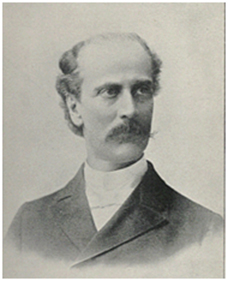
November 3, 2015
A Brief History of the 1893 World’s Parliament of Religions
Posted on Thursday, July 9, 2015
at 05:01AM
Edited by Derek Michaud
The 1893 World’s Parliament of Religions, held on the shore of Lake Michigan, Chicago, was the largest and most spectacular event among many other congresses in the World’s Columbian Exposition. The Exposition itself was a large trade fair that was to celebrate the quadricentennial of the discovery of America by Christopher Columbus.

| John Henry Barrows, the “architect” of the 1893 Parliament – Photo: Barrows |
The organizing process of the Parliament began after Charles Carroll Bonney, a layman in the Swedenborgian church and the president of the World’s Congress Auxiliary, appointed John Henry Barrows to administer the General Committee on the Congress of Religion, which eventually was called the World’s Parliament of Religions. Under Barrows’ leadership, the Parliament was expected to be “the most important, commanding, and influential, as surely it will be the most phenomenal fact of the Columbian Exposition.”
The committee consisted of sixteen persons from different religious backgrounds. Although most of them were from Christian mainline denominations, we could find distinguished names such as E.G. Hirsch (Jewish rabbi from New York), Jenkin Llyod-Jones (Unitarian), and P.A. Feehan (Catholic bishop).
In June 1891, more than three thousand copies of the Preliminary Address were sent out to the world, informing the plan of the 1893 Parliament and inviting religious leaders from all over the world to attend it. The responses were varied and well documented in Barrows’ two-volume report books (1893). The enthusiastic responses came from those like Max Müller, a champion in the field of comparative studies of religion. Although he deeply regretted failing to attend the Parliament, he expressed his hope that the Parliament would increase interest in the studies of religions. He also said that the Parliament “stands unique, stands unprecedented in the whole history of the world.” Some other positive responses demonstrated particular interests, for instance, to show the supremacy of one religion over others or to clarify misconceptions about their religious traditions.
There were also those who disapproved. For instance, the Presbyterian Church in the United States of America, the home church of John H. Barrows, passed a resolution against convention. Yet, the fact that this resolution was passed hurriedly in the closing hours of the General Assembly in 1892 did not produce a unified voice among the Presbyterians; indeed, their opinion was divided.
Click on Link:







